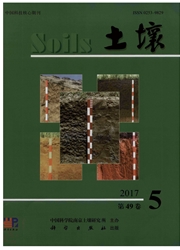

 中文摘要:
中文摘要:
以位于西南大学农业部重庆紫色土生态环境重点野外科学观测试验站1990年设立的长期免耕试验田为研究对象,通过采集0~60cm土壤,应用等质量计算方法,探讨了冬水田平作(DP)、水旱轮作(SH)、垄作免耕(LM)和垄作翻耕(LF)等不同耕作方式对土壤全硫和有效硫的影响。结果表明,在0~60 cm深度内,土壤全硫和有效硫含量呈现出明显的垂直递减规律,即随着土壤深度的增加,含量逐渐降低;不同耕作方式下,土壤全硫含量及储量为LM〉SH〉DP〉LF,有效硫含量及储量为LM〉DP〉LF〉SH。长期垄作免耕提高了土壤全硫及有效硫的含量和储量,与对照DP处理相比,LM处理全硫与有效硫含量分别增加了20.80%和1.31%,储量分别增加了19.54%和5.36%。耕作层(0~20 cm),DP、SH、LM、LF处理土壤有效硫平均含量分别为27.15、13.45、31.43和24.01 mg/kg,DP、LF以及LM处理为硫不缺或硫丰足,而SH处理为缺硫土壤(土壤有效硫含量〈16 mg/kg)。对缺硫土壤,应重视硫肥的施用,以促进农作物产量和品质的提高。
 英文摘要:
英文摘要:
Soil total sulfur and available sulfur based on a long-term experiment with various tillage systems were studied in a purple paddy soil at the farm of Southwest University,Chongqing,China.The experiment included four tillage treatments:conventional tillage with rice only system(DP),conventional tillage with rotation of rice and rape system(SH),no-till and ridge culture with rotation of rice and rape system(LM),and tillage and ridge culture with rotation of rice and rape system(LF).Soil samples were collected at depths of 0-10,10-20,20-30,30-40,40-50 and 50-60cm.The results showed that the contents of soil total sulfur and available sulfur both decreased with the increase of soil depth.The orders of the contents and storages of soil total sulfur in 0-60cm soil layers were both in an order of LMSHDPLF,and the orders of soil available sulfur were both LMDPLFSH,respectively.Overall,long-term LM treatment was a valid strategy for increasing the contents and storages of soil total sulfur and available sulfur in a purple paddy soil in Southwest China.Compared with DP treatment,LM increased the contents of soil total sulfur and available sulfur 20.80%and 1.31%,and increased the storages of soil total sulfur and available sulfur 19.54%and 5.36%,respectively.The contents of soil available sulfur in plow layer(0-20cm) of DP,SH,LM and LF treatments were 27.15,13.45,31.43 and 24.01 mg/kg,respectively.Except SH treatment was sulfur deficient,the tillage systems of DP,LM and LF were not short of soil sulfur.Application of sulfur fertilizer for sulfur deficiency soil should be highly valued to improve yield and quality of crops.
 同期刊论文项目
同期刊论文项目
 同项目期刊论文
同项目期刊论文
 Long-term tillage effects on soil organic carbon and dissolved organic carbon in a purple paddy soil
Long-term tillage effects on soil organic carbon and dissolved organic carbon in a purple paddy soil Contribution of root respiration to soil respiration in a rape (Brassica campestris L.) field in Sou
Contribution of root respiration to soil respiration in a rape (Brassica campestris L.) field in Sou Effect of land-use change on CH(4) and N(2)O emissions from freshwater marsh in Northeast China (vol
Effect of land-use change on CH(4) and N(2)O emissions from freshwater marsh in Northeast China (vol 期刊信息
期刊信息
